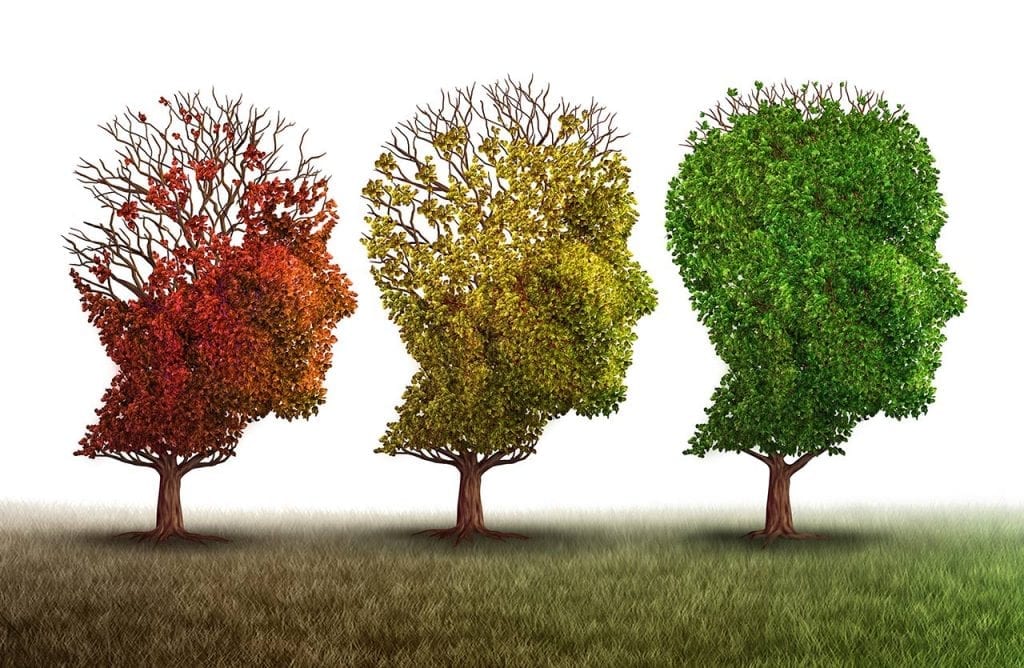Many of us know someone who has been affected by Alzheimer’s disease or other forms of dementia. Sadly, cognitive decline can take a toll on an individual’s ability to perform everyday activities like eating and getting dressed, and can really affect a person’s quality of life. The biggest risk factor associated with cognitive decline and dementia is something we have no control over—aging.
Fortunately, there’s a lot of evidence suggesting that certain lifestyle changes or behaviors can help reduce the risk of cognitive decline. But before we discuss these specific changes, let’s talk about what happens to the brain as we age.
The Aging Brain
The brain is one of the most interesting organs in your body—one that goes through more changes in your lifetime than any other part of your body. For example, from birth to age six, the brain is busy developing perception, memory, and emotions. The brain continues wiring itself from age 7 to 22. During this stage, essential neural connections form. The prefrontal cortex, which is the part of the brain that helps with impulse control and decision making, is fully matured. Your brain then “peaks” between the ages of 22 and 27. But what about after that? Here are some general changes that happen to the brain as you age:
- Brain mass. Around the age of 60, the brain experiences some shrinkage in the frontal lobe and hippocampus. This is the part of the brain involved in emotions, learning, and memory.
- Cortical density. The outer-ridged surface of the brain thins due to declining synaptic connections. Fewer connections can contribute to slower cognitive processing.
- White matter. The white matter in the brain is made up of myelinated nerve fibers that are bundled into tracts and carry nerve signals between brain cells. Researchers think myelin (the insulating layer that surrounds nerves) shrinks with age and, as a result, processing becomes a bit slower and cognitive function is reduced.1
- Neurotransmitter systems. Researchers also think that the brain generates fewer chemical messengers as you age, and this decrease in dopamine, serotonin, and other neurotransmitters may play a role in declining cognition and memory. It may also increase the risk of depression.2
Tips to Reduce Cognitive Decline
Fortunately, you can take steps to reduce your risk of cognitive decline. You just need to know where to start. Incorporating the following lifestyle changes can boost your brain power and keep you mentally sharp at any age.
Exercise. Physical activity can help prevent mild cognitive impairment by improving blood flow and increasing oxygen to the brain. Exercise can also help stimulate the production of growth hormones that help to create new brain cells.3 Try to engage in daily exercise (like power walking, swimming, or Zumba) that elevates your heart rate.
Hit the books. Exercise your brain by learning something new. Taking a class at a local college or community center can help reduce your risk of cognitive decline and keep your brain sharp. Unfortunately, crossword puzzles, Sudoku, and other “memory games” have not been proven to slow cognitive decline.4 Instead, scientists recommend doing any activity that challenges your brain. This can be as simple as using your non-dominant hand to write. But don’t just try one thing. Read a great book on a subject you know nothing about, learn to play a new board game, take a gourmet cooking class. The goal is to mix it up in ways that force your brain to work and learn.
Eat healthy foods. A healthy and balanced diet that focuses on vegetables and fruits can help reduce the risk of cognitive decline. Leafy greens like kale, spinach, and collard greens, and cruciferous veggies like broccoli are rich in brain-healthy nutrients, including vitamin K, folate, and beta carotene. It’s also smart to incorporate fatty fish like salmon into your diet. Fatty fish is a great source of omega-3 fatty acids, which are healthy unsaturated fats linked to lower blood levels of beta-amyloids (peptides that are the main component of the amyloid plaques found in the brains of people with Alzheimer’s disease). The natural plant pigments that give berries their rich color, flavonoids, have also been shown to help improve memory.5 We recommend adding some to your morning cereal or smoothie.
Mind your mental health: Some studies link a history of depression with an increased risk of cognitive decline. This is why it’s important to seek medical treatment if you have symptoms of depression or anxiety. Stress can also undermine brain function. Prolonged stress is often associated with health problems like heart disease and sleep problems. But a recent study published in the journal Neurology reported that higher blood levels of the stress hormone cortisol are also associated with memory impairments and smaller brain volumes in young and middle-aged adults.6 If you suffer from chronic stress, finding ways to cope, such as mindfulness, meditation, and deep breathing, can help protect your brain.
Changes in cognitive function are common during normal aging, but cognitive decline and memory loss are not necessarily inevitable. Adopting these healthy habits can help protect the brain against these unwanted changes. And it’s never too late to start!
References
- Peters A. The effects of normal aging on myelinated nerve fibers in monkey central nervous system. Frontiers in Neuroanatomy. 2009; 3:11.
- Peters R. Aging and the brain. Postgraduate Medical Journal. 2006; 82(964): 84-88.
- How exercise improves cognitive function and overall brain health. Urology of Virginia. 2019; https://www.urologyofva.net/articles/category/healthy-living/3330548/how-exercise-improves-cognitive-function-and-overall-brain-health#:~:text=It%20prevents%20mild%20cognitive%20impairment,to%20create%20new%20brain%20cells
This article is for informational purposes only. This article is not, nor is it intended to be, a substitute for professional medical advice, diagnosis, or treatment and should never be relied upon for specific medical advice.

Share this Post